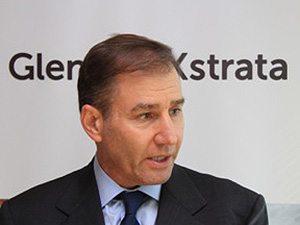
[miningmx.com] – GLENCORE would be prepared to return 100% of any free cash if it found no use for it in either brownfields growth or merger and acquisition activity, said the Swiss-headquartered firm’s CEO, Ivan Glasenberg.
Responding to questions following the group’s half-year figures, in which it unveiled a $1bn share buy-back programme, Glasenberg said: “We don’t want a lazy balance sheet so we would kick out 100% of cash if there’s nothing else to spend it on”.
Including the repurchase of $700m convertible bonds in June, the total buy-back was $1.7bn. The shares would be held in the company’s treasury and could be held for acquisition or cancelled in the future, said Glencore CFO, Steve Kalman.
Glencore sold its shares in Peruvian copper producer, Las Bambas, for $6.5bn in July and decided to divvy up the proceeds in thirds with two-thirds, or $4bn, used to reduce debt and to buy a 33.3% stake in Chad oil play Caracal for $1.3bn.
In addition to the $1bn in share buy-backs, another $1bn was pumped into dividends which increased to 6 US cents per share, an 11% increase year-on-year.
Glencore had returned more than $7.9bn which was more the raised by the company in its London initial public offering, said Glasenberg.
Glencore earlier today posted an 8% year-on-year increase in net income excluding one off items for the six months ended June 30 of $2bn equating to a 7% share earnings lift year-on-year to 7 US cents.
The bulk of the earnings improvement was from Glencore’s marketing division which increased adjused earnings before interest and tax 27% to $1.5bn whilst the group’s industrial assets – or its mines – increased pretax contribution 3%.
Glencore said challenging commodity prices in its industrial assets was offset by currency exchange benefits, but the group’s energy division lost ground in the interim with the oil sector in particular suffering the effects of increased competition.
Commenting on the market, Glasenberg said that the super-cycle wasn’t over but had been “hurt” by additional supply from mining companies.
Tony Robson, an analyst at BMO Capital Markets described the buy-back as “refreshing” following the disappointment yesterday (August 19) when BHP Billiton passed up either a special dividend or buy-back.
He noted, however, that the $1bn buy-back was “a nominal sum”, adding that it indicated “… the company is retaining most of the Las Bambas proceeds for future acquisitions, which should add to growth”.
In a note titled “Finally some excess cash”, Citi said the buy-back signalled Glencore had confidence in its free cash flow and balance sheet.
“Although it is relatively small in the context of the group’s $83bn market cap … it [share buy-back] underlines the group’s confidence that it can keep improving cash flows even in the current, lower commodity price, environment,” said Morgan Stanley.
Glasenberg said that almost all of the group’s expansionary capital expenditure would have been completed by the end of the 2015 financial with sustaining capital ranging from $2.5bn to $4bn a year.
“We are very happy for the company to kick out cash,” he said. “Why our colleagues in the industry are not doing it, I don’t know; maybe they are concerned.
“We know what our expansionary capital is, and it comes to an end in 2015, so even if prices weaker this is a cash generating machine,” he said.
Kalman also raised the prospecting of paying special dividends owing to the unmanageability of large share buy-back programmes.
“Our approach on buy-backs is how manageable it is. $1bn is of size that is manageable. Based on feedback that is generally received, I would say there is overwhe;ming preference for buy-back concept,” he said.










